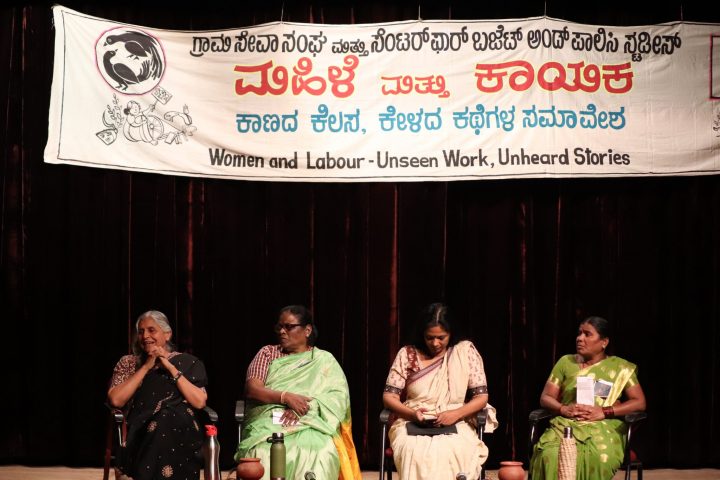Bengaluru Senior Economist Jaya Mehta, Ex-Minister Motamma, well-known singer M.D.Pallavi and Navajeevana Mahila Sangha, senior member Mokshamma inaugurated the Convention on “Women and Labour – Unseen Work, Unheard Stories” with a plant watering ceremony. The Convention was organized by Gram Seva Sangh and CBPS (Centre for Budget and Policy Studies) and was held at the Kodaji Basappa Auditorium last February 29, 2020.
After the inauguration, M.D. Pallavi started the convention with a welcome song and narrated multiple stories to portray how women’s work often goes unseen and their voices unheard, not only because their work is considered “domestic” but because various circumstances, including censorship, constrain them even in professional spheres.
Jaya Mehta, an economist from the Joshi Adhikari Institute, spoke about their work on agrarian distress and the difficulty of relieving the situation because 93% of those involved in agriculture are either landless or are small and marginal farmers. She spoke about women having to play a vanguard role in resolving the agrarian distress as cooperative farming and collectivization of labor is the only way out. Women have an important role to play as many women are now in de facto control of land, either because of the migration of male folk in search of employment or because of the high rate of farmer suicides.
The moderator for the panel on women’s’ work, Nalini Shekhar, spoke about how women’s work is not often considered as work based on her experience with waste-pickers in Bengaluru where even waste-pickers themselves devalued their work. In the same panel, Ms. Shobha Raghuram emphasized the criticality of understanding women’s presence in the production economy, both in terms of means of production as well as production relations. Dr. Anupama spoke about the importance of defining whether we work by our choice or whether work imposed on us. She also spoke about how coercion is not always done by others and that sometimes the amount of sacrifice women choose to make is also a problem. In order to answer the question of how to make women’s work seen, the panel emphasized on devolution of power in the production structures.
In the panel on women’s movements, various speakers talked about the importance of the collectivization of women to make their voices heard. Ms. Lakshmi spoke about how domestic workers got recognition and respect for their work only after the formation of their union. Ms. Nagalakshmi spoke about how women’s struggle is multifaceted as they have to struggle within their homes as well as with the power structures in the external world. She spoke about the importance of unions in such a context. Not only do they help in matters of work but they also give them the confidence to extend their voice to other spheres. Kalyani Menon Sen then spoke about how the recent protests by women in India are a key moment in feminist politics as women from the low-income minority population are asserting their rights of citizenship. The panel emphasized the role of collectives as well as of various collectives coming together to make women’s work seen and their stories heard.
The panel on women’s collectives discussed the challenges faced in forming these collectives. Gita Menon spoke about how women in themselves are not a homogeneous entity and how caste or class afflictions often present formidable challenges in the formation of these collectives. Ms. Prathibha underlined the importance of adopting non-discriminatory practices at the workplace and providing living wages for establishing the dignity of life for women workers. Ms. Mokshamma, while talking about Devadasis, emphasized the importance of having female employees at the counseling centers so that women can approach these centers with confidence and dignity.
In the panel on Reimagining the Future, Sharada Gopal said that rural women often suffer from an identity crisis as they are not recognized as farmers and are often treated only as laborers. Especially for Dalit women, there is an added complexity because of the stigma associated with them. V. Gayatri emphasized the importance of nutrition to be recognized as a right for rural women. Women are yet to acquire leadership roles in local governance and we must work towards realizing it in the future.
Sabeeha Bhoomi Gowda, VC of the Akkamahadevi Women University, highlighted a few important observations of the convention and said, we need to salute the marginalized rural women, because of the tough time they are going through and who are still challenging these in contemporary times. We need to learn lot from them and extend the learnings towards academia as well.
Transman Rumi Haris expressed that we need to be inclusive of sex workers, LGBT communities and other professions these communities engage with to make such efforts more inclusive and then sang the vachana’s song. The Agni team women group performed the Paray attam folk number and Pervin Verma sung songs with guitar accompaniment, concluding the session.
Gandhi Bhavan, Hasirudala, Fields of Views, N.S.S contributed towards organizing the convention with the active participation of many women movements, unions and organizations.
As reported by Abhilash, Secretary, Gram Seva Sangh










